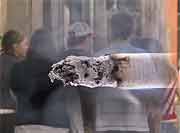
THURSDAY, March 7 (HealthDay News) — The more you’re exposed to secondhand tobacco smoke, the more likely you are to develop early signs of heart disease, a new study indicates.
The findings suggest that exposure to secondhand smoke may be more dangerous than previously thought, according to the researchers.
For the study, the investigators looked at nearly 3,100 healthy people, aged 40 to 80, who had never smoked and found that 26 percent of those exposed to varying levels of secondhand smoke — as an adult or child, at work or at home — had signs of coronary artery calcification, compared to 18.5 percent of the general population.
Those who reported higher levels of secondhand smoke exposure had the greatest evidence of calcification, a build-up of calcium in the artery walls.
After taking other heart risk factors into account, the researchers concluded that people exposed to low, moderate or high levels of secondhand smoke were 50, 60 and 90 percent, respectively, more likely to have evidence of calcification than those who had minimal exposure.
The health effects of secondhand smoke on coronary artery calcification remained whether the exposure was during childhood or adulthood, the results showed. The study findings are scheduled for presentation Thursday at the annual meeting of the American College of Cardiology (ACC), in San Francisco.
“This research provides additional evidence that secondhand smoke is harmful and may be even more dangerous than we previously thought,” study author Dr. Harvey Hecht, associate director of cardiac imaging and professor of medicine at Mount Sinai Medical Center in New York City, said in an ACC news release.
“We actually found the risk of secondhand smoke exposure to be an equivalent or stronger risk factor [for coronary artery calcification] than other well-established ones such as high cholesterol, hypertension and diabetes. Passive exposure to smoke seems to independently predict both the likelihood and extent of [calcification],” Hecht added.
The findings provide yet more evidence of the need for enforceable public smoking bans and other measures to protect people from secondhand smoke, he said.
“Tobacco smoke can damage the coronary arteries of nonsmokers through many different ways, which can lead to plaque formation and then to heart attacks, so this lends more [credence] to enforcing smoking bans,” Hecht noted in the news release.
To aid prevention of heart disease, discussion of secondhand smoke exposure should be included as a routine part of medical exams, he suggested.
While the study found an association between exposure to secondhand smoke and calcium build up in coronary arteries, it did not prove a cause-and-effect relationship.
The data and conclusions of research presented at medical meetings should be considered preliminary until published in a peer-reviewed medical journal.
More information
The U.S. Centers for Disease Control and Prevention has more about secondhand smoke.

